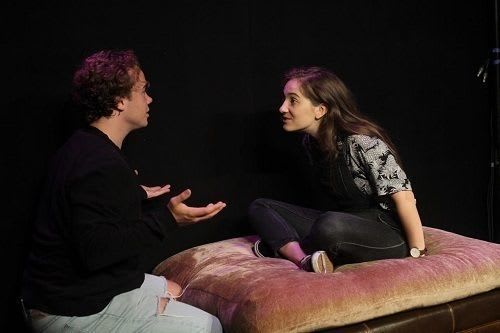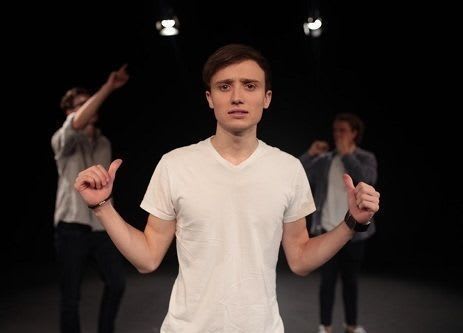Blind Elephant’s double-bill at the Tristan Bates Theatre of two 30-minute plays by James Saunders makes deft lightness of loneliness and lostness.
There are echoes of Ionescu and Beckett in After Liverpool. “It’s so funny, how we don’t talk anymore,” the song might go, but these four characters have plenty to say—it’s just that their words don’t hit, or know, their target. As Saunders’s own line states, “there is no communication, this is ping pong”.
The staging is minimalist: two pairs of uncomfortable chairs angled either side of a central '70s pouffe to which two disconnected couples—Alex and Billie, Charlie and Dani (suitably gender-neutral names)—retreat from failed attempts at conversation, to slump in despair or collapse in short-lived passion.
The two couples argue about whether they want to go to the cinema—Charlie only asks because he thinks Dani might want to go; he doesn’t want go—and who should eat the last apple in the fruit-bowl. They know each other’s habits, says Billie—who wear slippers, how many sugars they have in their tea—but they don’t know each other. They are talking to themselves. Does one partner want the other one to leave? Do they know their own minds?
Words get deconstructed and tied in knots until the scabs over these relationships have been scratched and unpicked so that it seems no amount of sticking plaster can put them back together again. Never has Forster’s dictum ‘only connect’ seemed more relevant.
Jessica Revell skilfully shows how Billie attempts to bring a certain feminine clarity to the discussion, though the result is obfuscation, and she’s a master of the raised eyebrow and condescendingly crooked grin, rendering Sammy Moore’s Alex more and more eager to please, and more and more despondent. As Charlie, Ross McCormack’s puppyish honesty is no match for deadpan linguistic dissections of John Pritchard’s Dani.
Though, by the close, equanimity seems restored, the silences are echoing loudly and it’s clear that the passive aggression won’t have a happy ending.
Games takes us into meta-theatre à la Pirandello, as the actors present rehearsals for a performance of an experimental courtroom drama based on the My Lai massacre, seeking to push themselves and the audience to extremes, to understand why Captain Ernest Medina—who was accused of responsibility for the March 1968 mass killings of unarmed South Vietnamese men, women and children—might have felt compelled to shoot 150 babies, believing them to be booby-trapped Viet Cong.
The Director (Moore) pushes the impersonator of Medina (Pritchard) to the limits as the ‘theatrical’ cast argue about the logic and intensity of his witness box testimony. The result borders respectively on drollery and hysteria, as the players move from intellectual detachment to visceral emotional engulfment.
The Blind Elephant team switch from one extreme to the other with gut-lurching swiftness and astonishing ease. Their timing is excellent, and the slickness with which they move between roles and perspectives attests to long-lived familiarity with the plays and each other.
Increasingly, the play-within-a-play cast question what they are doing and why they are there at all. The company’s decision to ask the audience to draw names from a hat to see who plays which part in After Liverpool begins to acquire its own logic.
As John Pritchard’s emotionally unbalanced rant about the role and purpose of actors in the ‘real’ world acknowledges, it’s about words which the actors control, but who controls the actors? The playwright with his playscript? The director with his demands and instructions? The audience with their expectation? Can theatre change the world or is it pointless?
Sammy Moore made effective work of the Director’s rather worthy and extended homily about the social responsibility of theatre and the arts, but this was clearly a familiar and sympathetic audience and one wonders whether the appeals for audience interaction always come off so well.
That said, Games, a play-within-a-play-within-a-play, pokes fun and catches out the audience. And Blind Elephant has the measure of its linguistic flamboyance and playful philosophising.
They makes this double-bill seem both attractively lightweight and strangely thought-provoking.


